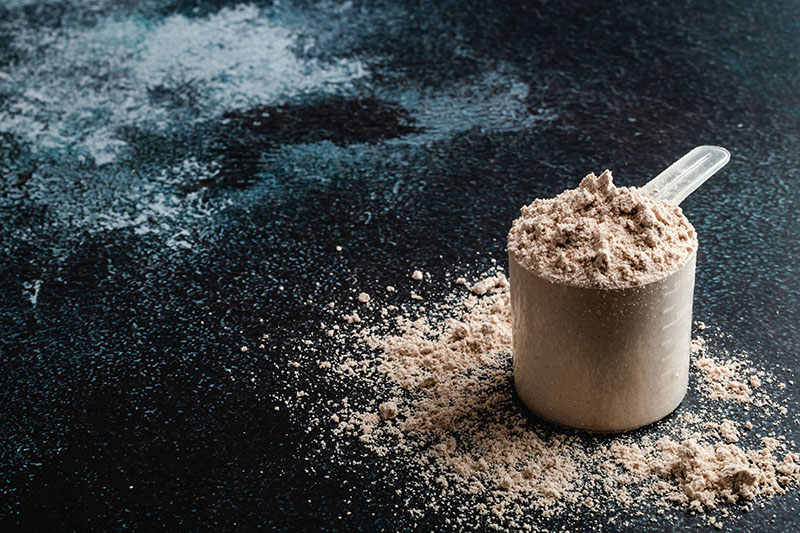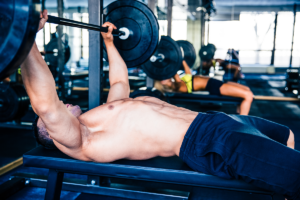
Everyday Chemicals Are Screwing Up Your Testosterone
You may have already read my other article on 7 habits which are killing your testosterone. There was a section in that on Water because

Should you take your whey protein shake before or after your workout?
Multiple human case studies have proven there is no difference in terms of muscle growth or strength gains no matter when you drink your whey protein shake.
The old idea there is an “anabolic window” has been long since disproven even though it was so deeply ingrained within the bodybuilding community for so long it’s still widely preached as fact.
However, there may be a huge benefit to drinking your shake pre-workout which scientist have not directly measured but we do have a strong insight as to why before your workout, is the best time to consume your whey protein.
Let’s dive into the human case studies and find out. First we will discuss the anabolic window myth.
It’s an absolutely proven falsehood that you need to consume your whey protein within 30 minutes after your workout to maximize bioavailability and muscle uptake.
21 resistance trained college aged men were given 25g of whey protein either immediately before or after their workout for 10 weeks.
At the end of the study researchers saw no difference in muscle or strength gains between either group. (1)
Another study on 26 elderly men was performed where the men were either given protein immediately before and after their workout or were given a placebo with no protein at all.
Researchers ensured that all of the participants consumed an adequate amount of protein throughout the day via food so there would not be a total protein shortage in the placebo group which would have skewed the results.
At the end of the 12 week study, all of the participants increased in strength and muscle size researchers found no difference between the protein group and the placebo group. (2)
In other words, even taking a protein supplement both immediately before and immediately after working out made no difference as long as total protein intake was adequate for the day.
33 resistance trained men were separated into 3 groups.
At the end of the 10 week study all of the men saw positive increases, however, there was no difference between any of the 3 groups in strength, body mass or percentage of body fat. (3)
Again, as long as total protein intake was adequate, this was all that mattered and supplementing wasn’t needed at all as proven by the control group performance as well as both supplement groups.
There have been a couple of human case studies which have shown some potential benefits to drinking your protein shake at a particular time. (4)
However, in a massive peer review of both these studies and the studies showing no benefit (67 studies in total), the researchers discovered something significant.
“sub-analysis showed that discrepancies in total protein intake explained the majority of hypertrophic differences noted in timing studies.” (5)
What this means is that the studies showing any positive benefit, is probably because the participants not receiving a whey protein shake were protein deficient in their diet.
Obviously if you are not consuming enough protein in your day, you need a supplement to help you get there.
However, that has nothing to do with supplement timing and to skew the study to make it sounds as if it does, is an oversight at best and “fake science” at worst.
As you have seen from the human case studies above, consuming a whey protein shake alone before or after your workout will not encourage additional muscle growth or increase strength as long as your daily protein intake is adequate.
HOWEVER, consuming whey protein along with glucose (dextrose) and creatine before your workout may help increase both size and strength.
There are a handful of reasons for this and you can click on the links in the above paragraph to see exactly how dextrose and creatine may help take your workouts up a notch.
For the purpose of this article though I’m going straight into 2 human case studies on it.
Resistance trained males were split into 2 groups and were given a combination of whey protein, creatine and dextrose before and after exercise, or in the morning and evening.
The men who received the supplement pre and post exercise vs in the morning and evening saw a significantly greater increase in both strength and lean body mass.
The pre/post group also saw a significant increase in total creatine levels as well as glycogen (dextrose) levels over their morning/evening counterparts. (6)
Glucose or Dextrose is a specific type of carbohydrate and has a very similar effect in the body to maltodextrin.
The big difference is that maltodextrin is released into the bloodstream at a slower rate so is typically the favorite marathon runners while dextrose tends to be favored by bodybuilders and athletes performing workouts under 2 hours.
In a small, although well performed study on 9 men, using muscle biopsies to test for muscle protein synthesis (MPS) as well as muscle protein breakdown (MPB), researchers found no difference between those who took 25g of whey protein alone and those who supplemented with 25g of whey protein + 50g of maltodextrin after their workouts.
In other words, if you are going to add dextrose or maltodextrin to your whey protein, you need to do it BEFORE exercise not after.
I’ve written extensively how BCAAs are overrated and in my opinion a waste of money.
The only thing BCAAs seem to be proven to help with is delayed onset muscle soreness or DOMS when taken pre-workout.
As I pointed out in my article on BCAAs though, it would be much more beneficial to supplement with a whey protein drink before your workout over BCAAs as a standalone, since whey will provide you with the full spectrum of essential amino acids.
25g of whey protein taken pre-workout is going to provide you with all the BCAAs you need to help decrease muscle soreness and not only do you get a lot more benefits from it overall but it’s much cheaper than buying a BCAA supplement.
Plus whey protein offers the additional benefit of containing lactoferrin which is a multifunctional protein and has been shown to have an anti-inflammatory effect in addition to supporting a natural immune response to disease. (8)
Whey protein, especially whey protein isolate is the most bioavailable form of protein you can buy and it provides a lot of health benefits in addition to being a great way to make sure you are getting adequate protein each day.
There is little to zero evidence you need to consume it at any particular time with the exception that taking it pre-workout will probably help decrease soreness.
And if you combine it with dextrose and creatine as a pre-workout staple there may be some additional benefits there.
For this reason I personally consume whey protein pre-workout along with both dextrose and creatine and I recommend you do as well.
References

You may have already read my other article on 7 habits which are killing your testosterone. There was a section in that on Water because

Rhodiola Rosea stands out as a potent adaptogenic herb with a rich history of traditional use and a growing body of scientific research. Revered for

In this comprehensive article, we will explore what L-tyrosine is, its benefits as a pre-workout supplement, the correct dosage, and other potential health benefits it

Betaine anhydrous is becoming an increasingly popular ingredient for pre-workouts. In this article, we will explore the fundamentals of betaine anhydrous, its connection to carnosine,

Beta-alanine is a pre-workout powerhouse. From boosting workout performance to potential anti-aging effects, discover why this amino acid is a favorite among health buffs.

You may have already read my other article on 7 habits which are killing your testosterone. There was a section in that on Water because

Rhodiola Rosea stands out as a potent adaptogenic herb with a rich history of traditional use and a growing body of scientific research. Revered for

In this comprehensive article, we will explore what L-tyrosine is, its benefits as a pre-workout supplement, the correct dosage, and other potential health benefits it

In the ancient wilderness, a legendary creature prowled the untamed lands—a fierce and noble Alpha Wolf. This majestic beast possessed an aura of strength and resilience, leading its pack with unwavering authority.
In a parallel realm, a group of visionary alchemists delved into the mysteries of nature, seeking to create potent elixirs that could unlock the true potential of those who dared to embrace their inner power.
As fate would have it, these paths crossed, and an extraordinary alliance was forged. The Alpha Wolf and the alchemists found common ground in their pursuit of greatness, and thus, Alpha Wolf Nutrition was born.
United by a shared passion for excellence, the Alpha Wolf and the alchemists dedicated themselves to crafting supplements that harnessed the raw force of nature, empowering individuals to conquer their inner and outer worlds.
At Alpha Wolf Nutrition, we draw inspiration from the primal instincts of the Alpha Wolf—the embodiment of strength, leadership, and vitality. We believe that every individual possesses a dormant power within, waiting to be awakened.
Through our meticulously crafted products, we strive to unleash this dormant potential, allowing you to thrive in the face of challenges and embrace your true nature.
Our commitment lies in providing you with the highest quality, scientifically proven ingredients, carefully curated to deliver optimal results. We leave no room for guesswork, basing our formulations on human-backed research to ensure real, tangible benefits. With us, you’ll find no “proprietary blends” or token additions—just pure, effective dosages that fuel your journey to greatness.
Join the pack of Alpha Wolves and embark on a transformative journey with Alpha Wolf Nutrition. Embrace your inner strength, rise above the ordinary, and conquer your aspirations. Unleash the power within and let the spirit of the Alpha Wolf guide you to achieve your highest potential. Welcome to Alpha Wolf Nutrition, where the path to greatness awaits.

Alpha Wolf Nutrition is based on real science and results for the people we serve.
We do not cut corners, we do not hide behind “proprietary blends” and we do not put in worthless amounts of token ingredients to fill up a label.
What we do, is kick ass!

© 2016 – 2023 Alpha Wolf
Discount Applied Successfully!
Your savings have been added to the cart.